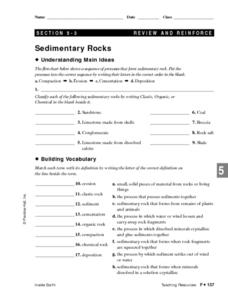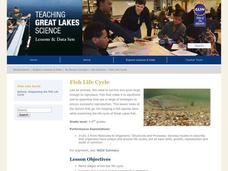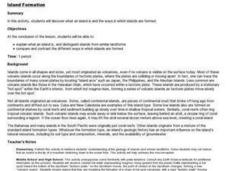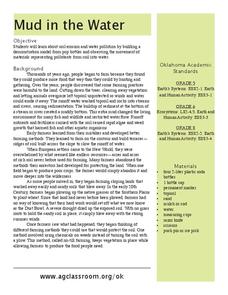Curated OER
A Rock’n Earth
Seventh graders identify the three types of rocks. In this earth science lesson, 7th graders model the rock cycle using crayon shaving. They explain how rocks change as they go through the cycle.
Curated OER
Earth Lesson Plans
Students gain understanding of how a fossil is formed and why they are so important. In this fossil lesson students create their own fossils.
Curated OER
Earth Structure and Processes
Students classify different rocks according to their types. In this earth science lesson, students explain how plate tectonics created Earth's landforms. They explain the continental drift theory and sea floor spreading in their own words.
Curated OER
Water, Water Everywhere and Not a Drop to Drink
Students identify the different stages in the water cycle. In this environmental science instructional activity, students research about different water pollutants in watershed. They describe ways to purify water.
Curated OER
Are you a river keeper?
Pupils perform healthy water practices by discussing and demonstrating acts of philanthropy. In this healthy water lesson plan, students read an article on how we can keep water clean, and create a LITWIS activity.
Curated OER
Fossil Formation
Students discuss fossils. In this science lesson, students simulate fossils within Earth's layers by using gummy fish and bread.
Curated OER
Ride the Rock Cycle
Students examine the steps of the rock cycle. They describe what happens to the rocks in each of the stages. They participate in a rock cycle game to help them with the steps.
Curated OER
How Does Flowing Water Shape a Planet's Surface?
Students investigate how flowing water influence landforms. In this earth science lesson, students observe water behavior as it flows from the stream table at various inclinations. They discuss whether water shaped Mars landforms or not.
Curated OER
Fossil Impressions of Ancient Life
Students make a mold using Plaster of Paris and then make a cast using that same mold. They pick a fossil and describe how it looks. They write a fictionalized story about its life, or burial. (
Curated OER
Days of '49: "I've Been Toiling Hard for the Last Two And a Half Years"
Students trace the stages of gold mining in California. They discuss the life of a gold miner and how the discovery of gold influenced towns and cities in California during the 1949 Gold Rush.
Curated OER
Sedimentary Rocks
Second graders receive an introduction to the rock cycle. They dicuss the geologic rock cycle. They create a simulation of a sedementary rock.
Curated OER
Landforms of Illinois
Learners discover the primary landforms of Illinois. They examine how those landforms were formed as well. In groups, they research one of the landforms from their vocabulary list. They create their landform in a shoebox and present it...
Curated OER
Earth's History
Sixth graders investigate how fossils are formed. They analyze a photo of the Grand Canyon, and create a fossil cast and mold using plaster of paris and shells.
Michigan Sea Grant
Fish Life Cycle
Fish are no different when it comes to a living being's primary objective—to reproduce. They do differ, including from fish species to fish species, in their life cycles, survival tactics and reproductive strategies. After discussion of...
Curated OER
Island formation
Students explain what an island is, and distinguish islands from similar landforms. They compare and contrast the different ways in which islands are formed.
Curated OER
Conquests of Land and People in the Pacific Northwest by the Fur Trade
Students examine how the Hudson's Bay Company dominated trade in the Pacific Northwest and compare and contrast how the Hudson's Bay Co. conducted business with competitors, suppliers, and customers to the prominent American fur trade...
Curated OER
Let's Make a Tubeworm!
Students discuss deep-sea chemosynthetic communities then create a poster of a three-dimensional tubeworm. In this creative lesson students create their own tubeworm and write a written report on it.
Curated OER
Planetary Surface Evolution and Resurfacing
Students study the concepts of planetary surface terrains and resurfacing. In this surface lesson students simulate the history of a planet's surface and devise ways to remove craters from their models.
Curated OER
Rocks and Minerals
Students identify how weathering and erosion effect the Earth's surface. In this weathering and rocks lesson plan, students study various types of rocks in water and brainstorm ways the Earth's surface changes. Students view an...
Curated OER
Pond Ecosystem Field Trip
Students investigate the environment by participating in a class trip. In this pond ecosystem lesson, students define a list of vocabulary terms associated with ponds such as invertebrate and metamorphosis. Students attend a field trip...
Curated OER
Mud in the Water
Sixth graders investigate erosion. In this erosion lesson, 6th graders explore how farming changes the environment. Students construct an erosion model and research ways to protect the soil from excess mud generated by farming.
Curated OER
Wellington Fault Field Trip
Students take a field trip to Harcourt Park in California to view the results of river erosion and an active fault line. In this science lesson plan, students go to different parts of the park to discuss the results.
Curated OER
Water Quality Monitoring
Students comprehend the four parameters of water quality. They perform tests for salinity, dissolved oxygen, pH and clarity or turbidity. Students comprehend why scientists and environmental managers monitor water uality and aquatic...
Other popular searches
- Sedimentary Rocks
- Deposition of Sediment
- Sedimentary
- Sedimentary Rock Layers
- Edible Sedimentary Rocks
- Define Sedimentary Rocks
- Sedimentary Rocks Fossils
- Sedimentary Rock Formation
- All About Sedimentary Rocks
- Types of Sedimentary Rocks
- Sedimentary Rock Experiment
- Sedimentary Rocks Minerals

























